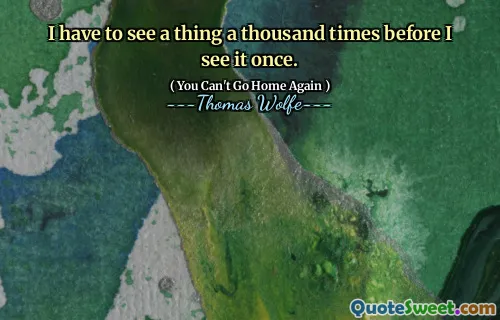"You Can't Go Home Again," written by Thomas Wolfe, explores the themes of change, nostalgia, and the struggle for identity. The protagonist, George Webber, returns to his hometown after achieving some success as a writer, only to find that the place he once knew has transformed significantly. This stark contrast between his memories and the present reality leads him to feel alienated, underscoring the idea that one can never truly go back to the past unchanged.
The novel delves deeply into the human experience and our connections to our origins. Webber's journey reflects a broader commentary on the American landscape and the cultural shifts occurring during the early 20th century. Wolfe's rich, evocative prose captures the complexities of returning home, illustrating how personal and societal evolution can disrupt one's sense of belonging.
Ultimately, "You Can't Go Home Again" serves as a poignant reminder that both people and places are in constant flux. Wolfe's exploration of these themes resonates with readers, encouraging them to reflect on their own relationships with their pasts and the inevitable changes that life brings. Through Webber's experiences, Wolfe articulates a universal truth about the nature of home and identity.
More »
Today Birthdays
1970 -
Shonda Rhimes
1599 -
Edmund Spenser
1940 -
Edmund White
1957 -
Lorrie Moore
1691 -
George Fox
1961 -
Wayne Coyne
1934 -
Carolyn See
1965 -
Bill Bailey
1967 -
Masha Gessen
1937 -
George Reisman
1890 -
Elmer Davis
1978 -
Nate Silver
1884 -
Sophie Tucker
1960 -
Matthew Bourne
1980 -
Maria de Villota
1977 -
Orlando Bloom
1976 -
Michael Pena
1952 -
Geoffrey Canada
1951 -
Frank Peretti
1955 -
Trevor Rabin
1808 -
Salmon P. Chase
1947 -
Robert Martin
1927 -
Sydney Brenner
1926 -
Carolyn Gold Heilbrun
1954 -
Denise Morrison
1960 -
Eric Betzig
1968 -
Traci Bingham
1919 -
Robert Stack
1970 -
Keith Coogan
1989 -
Beau Mirchoff
